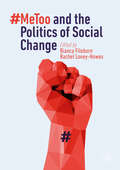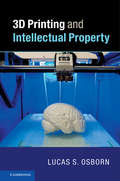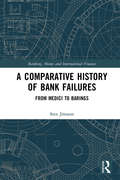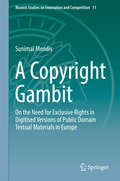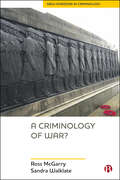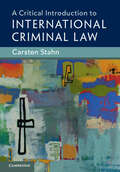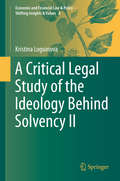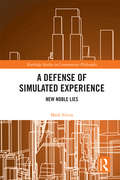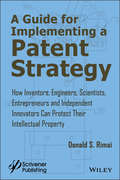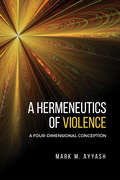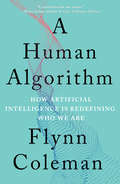- Table View
- List View
"I Hereby Resign": Job Transitioning: How Individuals Properly Prepare, Resign And Move To The Competition, And How Companies Best Manage That Proc
by Steven L. ManchelA concise, practical guide to problem-free job transitions for employees, recruiters, and business leaders: “Incredibly user-friendly.” —James B. Adelman, Esq., Senior Vice President, General Counsel, Commonwealth Financial NetworkThe fundamental purpose of this book is to provide a useful how-to guide for people who are deciding whether to leave their current employer and join a direct competitor, and for companies involved in the hiring and recruiting process. Many employees are subject to so-called Non-Competition Agreements and, consequently, already understand that there are significant risks, legal and business, when transitioning jobs. However, what most do not appreciate is that there are a host of laws and protocols, having nothing to do with whether an employment contract exists, that govern the way one may properly prepare to leave and the manner in which the hiring company can bring the new hire on board. Every year millions voluntarily leave their companies to join a direct competitor and millions more explore the possibility. All such undertakings, even if the ultimate decision is not to leave, bring legal and litigation and business risks—risks that can result in large damage awards, injunction orders, and general corporate disruption and turmoil. This book by an experienced attorney offers important guidance and practical tips on avoiding and minimizing those risks.“This book should find its way to the desk of anyone who is contemplating a transition to a competing firm, now or in the future. It is also a ‘must-read’ for all organizations involved in lateral hiring, as it explains the ‘do’s’ and ‘don’ts’ of talent acquisition.” —Boris Groysberg, Richard P. Chapman Professor of Business Administration at Harvard Business School
#MeToo and the Politics of Social Change
by Bianca Fileborn Rachel Loney-Howes#MeToo has sparked a global re-emergence of sexual violence activism and politics. This edited collection uses the #MeToo movement as a starting point for interrogating contemporary debates in anti-sexual violence activism and justice-seeking. It draws together 19 accessible chapters from academics, practitioners, and sexual violence activists across the globe to provide diverse, critical, and nuanced perspectives on the broader implications of the movement. It taps into wider conversations about the nature, history, and complexities of anti-rape and anti-sexual harassment politics, including the limitations of the movement including in the global South. It features both internationally recognised and emerging academics from across the fields of criminology, media and communications, film studies, gender and queer studies, and law and will appeal broadly to the academic community, activists, and beyond.
'Abd al-Rahman b. 'Amr al-Awza'i (Makers of the Muslim World)
by Steven C. Judd&‘Abd al-Rahman b. &‘Amr al-Awza&‘i (c.707–774) was Umayyad Syria&’s most influential jurist, part of a generation of scholars who began establishing the first formal structures for the preservation and dissemination of religious knowledge. Following the Abbasid revolution, they provided a point of stability in otherwise unstable times. Despite his close ties to the old regime, al-Awza&‘i continued to participate in legal and theological matters in the Abbasid era. Although his immediate impact would prove short-lived, his influence on aspects of Islamic law, particularly the laws of war, endures to this day.
101 Things I Learned® in Law School (101 Things I Learned)
by Matthew Frederick Vibeke Norgaard MartinA provocative, accessible, and cleverly illustrated guide to legal principles and practice, by a law instructor and internationally experienced attorneyThis might be the most useful book law students ever read. Not because it contains the details of case law, but because it teaches them how to think like a lawyer. From the fundamentals of effective argument to the principles, structures, and assumptions underlying our legal system, 101 Things I Learned in Law School makes the impenetrable clear and the complex understandable. Illustrated lessons summarize landmark cases and illuminate a fascinating range of questions, including: * What is the difference between honesty and truthfulness? * Why is circumstantial evidence often better than direct evidence? * How does one find the proper sources to substantiate a legal argument? * Why do states deliberately pass unconstitutional laws? * How can testimony from a hostile witness be helpful?Written by an internationally experienced attorney and law instructor, 101 Things I Learned in Law School is a concise, highly readable resource for law students, graduates, professionals, and anyone else fascinated--or confused--by our legal system.
3D Printing and Intellectual Property
by Lucas S. OsbornIntellectual property (IP) laws were drafted for tangible objects, but 3D printing technology, which digitizes objects and offers manufacturing capacity to anyone, is disrupting these laws and their underlying policies. In this timely work, Lucas S. Osborn focuses on the novel issues raised for IP law by 3D printing for the major IP systems around the world. He specifically addresses how patent and design law must wrestle with protecting digital versions of inventions and policing individualized manufacturing, how trademark law must confront the dissociation of design from manufacturing, and how patent and copyright law must be reconciled when digital versions of primarily utilitarian objects are concerned. With an even hand and keen insight, Osborn offers an innovation-centered analysis of and balanced response to the disruption caused by 3D printing that should be read by nonexperts and experts alike.
9/12: The Epic Battle of the Ground Zero Responders
by William H. Groner Tom Teicholz9/12 is the saga of the epic nine-year legal battle waged by William H. Groner against the City of New York and its contractors on behalf of the more than ten thousand first responders who became ill as a result of working on the Ground Zero cleanup. These first responders—like AT&T Disaster Relief head Gary Acker and New York Police Department detectives Candiace Baker, Thomas Ryan, and Mindy Hersh—rushed to Ground Zero and remained to work on the rescue and recovery mission, which lasted for the next nine months. Their selfless bravery and humanity were rewarded with horrible health issues resulting from the toxic stew of chemicals present in the dust and debris that government officials such as Mayor Rudy Giuliani and EPA chief Christine Todd Whitman had assured them was safe. Groner, a lead attorney in the mass tort litigation, fought for their illnesses to be acknowledged and for them to receive validation and closure, as well as for compensation—an eventual aggregate award of more than $800 million. As detailed in 9/12, the battle for the Ground Zero responders was waged not only in the courtroom but also in the press, in medical and scientific research centers, and among politicians at the local, state, and federal levels, as well as in the halls of Congress to pass the Zadroga Health and Compensation Act. 9/12 weaves together Groner’s firsthand account with glimpses into the first responders’ lives as they try to understand and overcome their illnesses. The result is an intimate look into their battles—physical, mental, and legal—that will leave you cheering for these heroes who, in spite of everything, would do it all again. Told by Groner and journalist Tom Teicholz, 9/12 is the story of the brave public servants who showed up when their country needed them most, of their fight for redress, and of their victory in the face of the seemingly insurmountable.
A Case for Shareholders' Fiduciary Duties in Common Law Asia (International Corporate Law and Financial Market Regulation)
by Ernest LimThis book reconceptualises the role of the general meeting and shareholders in the listed companies in four leading common law jurisdictions in Asia (Singapore, Hong Kong, India and Malaysia) as one that should include fiduciary duties. It demonstrates why, when, by whom and how fiduciary duties should be imposed and how they could be enforced. In so doing, it refutes the long-standing common law rule that shareholders can generally vote as they please. The book advances the debate on a central notion of corporate law, namely, the interests of the company. It addresses the deficiencies in the law regulating conflicts of interest involving controlling shareholders and institutional shareholders and provides solutions to the problem of activist and passive minority institutional investors. This book challenges us to rethink the meaning and implementation of the long-term success of the company and shows how corporate governance should and could be made.
A Comparative Analysis of Policing Consumer Contracts in China and the EU
by Jiangqiu GeThis book seeks to fill a gap in the existing literature by describing the formulation, interpretation and enforcement of the rules on consumer contracts in China and the EU, and by mapping key similarities and differences. The study addresses selected issues regarding consumer contracts: sources of law in the two jurisdictions are first discussed to set the scene. Afterwards, one preliminary issue - how to define the concept of a consumer contract - and two substantive topics - unfair terms and withdrawal rights - are dealt with. Apart from the descriptive analysis, the book also provides possible explanations for these comparative findings, and argues that the differences in consumer contract rules can be primarily attributed to a disparity of markets. The book offers a valuable resource, particularly for researchers and practitioners in the fields of private law and comparative law.
A Comparative History of Bank Failures: From Medici to Barings (Banking, Money and International Finance)
by Sten JonssonStarting with Medici and Fugger and ending with Barings and Royal Bank of Scotland under neo-liberal de-regulation, the author gives an account of how a number of banks failed over a 500 year-period. The author offers an explanation of the leading ideas about the world and good society at the time, and summarizes this narrative using Streeck & Schmitter’s three bases for regulation of society: Community (spontaneous solidarity), State (hierarchical control), and Market (dispersed competition). <P><P>The bank failures are presented in the context of social philosophies of the day (scholasticism, mercantilism, neo-liberalism, and libertarianism), and the changing business practices (Bills of Exchange, rents and financial instruments of various kinds). The dominating explanation of financial crises has been market-related. Here, the author argues that managerial failures are an important contributor. He demonstrates the failure of management to act on early signals such as existential risk, strategic stress syndrome, and lack of proper oversight by top management. The author encourages a return to ethical principles for banks, suggesting that his ethical aspect should be at the core of the credit process of banks in the future. <P><P>With its interdisciplinary approach, this book will be an important contribution to the discussion surrounding bank failures. It will interest any scholar looking at the origins of financial crises and will be particularly useful for post-graduate students of economic and financial history, banking, finance and accounting.
A Constitutional History of the Kingdom of Eswatini (African Histories and Modernities)
by Hlengiwe Portia DlaminiSwaziland—recently renamed Eswatini—is the only nation-state in Africa with a functioning indigenous political system. Elsewhere on the continent, most departing colonial administrators were succeeded by Western-educated elites. In Swaziland, traditional Swazi leaders managed to establish an absolute monarchy instead, qualified by the author as benevolent and people-centred, a system which they have successfully defended from competing political forces since the 1970s. This book is the first to study the constitutional history of this monarchy. It examines its origins in the colonial era, the financial support it received from white settlers and apartheid South Africa, and the challenges it faced from political parties and the judiciary, before King Sobhuza II finally consolidated power in 1978 with an auto-coup d’état. As Hlengiwe Dlamini shows, the history of constitution-making in Swaziland is rich, complex, and full of overlooked insight for historians of Africa.
A Copyright Gambit: On the Need for Exclusive Rights in Digitised Versions of Public Domain Textual Materials in Europe (Munich Studies on Innovation and Competition #11)
by Sunimal MendisEuropean memory institutions are repositories of a wealth of rare documents that record public domain content. These documents are often stored in ‘dark-archives’ to which members of the public are granted limited access, resulting in the public domain content recorded therein being relegated to a form of ‘forgotten-knowledge’. Digitisation offers a means by which such public domain content can be made speedily and easily accessible to users around the world. For this reason, it has been hailed as the harbinger of a new ‘digital renaissance’. This book examines the topical issue of the need to preserve exclusivity over digitised versions of rare documents recording public domain content. Based on data gathered through an empirical survey of digitisation projects undertaken by fourteen memory institutions in five European Union Member States, it argues for the introduction of exclusive rights in digitised versions of rare documents recording public domain textual content as a means of incentivising private-sector investment in the digitisation process. It concludes by presenting a detailed proposal for a European Union Regulation that would grant memory institutions a limited-term related right in digitised versions of rare documents held in their collections subject to stringent exceptions and limitations that are designed to safeguard user interests.
A Criminology of War? (New Horizons in Criminology)
by Sandra Walklate Ross McGarryIn recent years, the academic study of ‘war’ has gained renewed popularity in criminology. This book illustrates its long-standing engagement with this social phenomenon within the discipline. Foregrounding established criminological work addressing war and connecting it to a wide range of extant sociological literature, the authors present and further develop theoretical and conceptual ways of thinking critically about war. Providing a critique of mainstream criminology, the authors question whether a ‘criminology of war’ is possible, and if so, how this seemingly ‘new horizon’ of the discipline might be usefully informed by sociology.
A Critical Introduction to International Criminal Law
by Carsten StahnInternational criminal law has witnessed a rapid rise after the end of the Cold War. The UN refers to the birth of a new 'age of accountability', but certain historical objections, such as selectivity or victor's justice, have never fully gone away, and many of the justice dimensions of international criminal law remain unexplored. Various critiques have emerged in socio-legal scholarship or globalization discourse, revealing that there is a stark discrepancy between reality and expectation. Linking discussion of legal theories, case-law and practice to scholarship and opinion, A Critical Introduction to International Criminal Law explores these critiques through five main themes at the heart of contemporary dilemmas: • The shifting contours of criminality and international crimes • The tension between individual and collective responsibility • The challenges of domestic, international, hybrid and regional justice institutions • The foundations of justice procedures • Approaches towards punishment and reparation Suitable for students, academics and professionals from multiple fields wishing to understand contemporary theories, practices and critiques of international criminal law. This title is also available as Open Access on Cambridge Core.
A Critical Legal Study of the Ideology Behind Solvency II (Economic and Financial Law & Policy – Shifting Insights & Values #4)
by Kristina LoguinovaThis book analyzes the impact of Solvency II. In recent years, EU legislators have sought to introduce fundamental reforms. Whether these reforms were indeed fundamental is critically investigated with regard to a post-crisis piece of financial legislation affecting the EU’s largest institutional investors: Solvency II. Namely, the last financial and economic crisis, the worst financial catastrophe of the last decade, revealed that financial law in particular was not sufficiently mature to maintain the existence of a robust and trust-worthy financial system that could protect society from economic decline. The work also makes concrete recommendations on achieving a more sustainable future. As such, it offers a valuable resource for anyone who is interested in the financial system, the EU political economy, insurance, sustainability, and Critical Legal Studies.
A Decent Life: Morality for the Rest of Us
by Todd May“In lively prose, May . . . breaks down complex philosophical concepts and uses a range of everyday examples to illustrate how morality can be practical.” —Publishers WeeklyIn a world full of suffering and deprivation, it’s easy to despair—and it’s also easy to judge ourselves for not doing more. Even if we gave away everything we own and devoted ourselves to good works, it wouldn’t solve all the world’s problems. It would make them better, though. So is that what we have to do? Is anything less a moral failure? Can we lead a fundamentally decent life without taking such drastic steps?Todd May has answers. He’s not the sort of philosopher who tells us we have to be model citizens who display perfect ethics in every decision we make. He’s realistic: he understands that living up to ideals is a constant struggle. In A Decent Life, May leads readers through the traditional philosophical bases of a number of arguments about what ethics asks of us, then he develops a more reasonable and achievable way of thinking about them, one that shows us how we can use philosophical insights to participate in the complicated world around us. He explores how we should approach the many relationships in our lives—with friends, family, animals, people in need—through the use of a more forgiving, if no less fundamentally serious, moral compass. With humor, insight, and a lively and accessible style, May opens a discussion about how we can, realistically, lead the good life that we aspire to.“A meditation on how striving for decency is a route towards personal satisfaction and happiness.” —Chicago Tribune
A Defense of Simulated Experience: New Noble Lies (Routledge Studies in Contemporary Philosophy)
by Mark SilcoxThis book defends an account of the positive psychological, ethical, and political value of simulated human experience. Philosophers from Plato and Augustine to Heidegger, Nozick, and Baudrillard have warned us of the dangers of living on too heavy a diet of illusion and make-believe. But contemporary cultural life provides broader, more attractive opportunities to do so than have existed at any other point in history. The gentle forms of self-deceit that such experiences require of us, and that so many have regarded as ethically unwholesome or psychologically self-destructive, can in fact serve as vital means to political reconciliation, cultural enrichment, and even (a kind of) utopia. The first half of the book provides a highly schematic definition of simulated experience and compares it with some claims about the nature of simulation made by other philosophers about what it is for one thing to be a simulation of another. The author then provides a critical survey of the views of some major authors about the value of certain specific types of simulated experience, mainly in order to point out the many puzzling inconsistencies and ambiguities that their thoughts upon the topic often exhibit. In the second half of the book, the author defends an account of the positive social value of simulated experience and compares his own position to the ideas of a number of utopian political thinkers, as well as to Plato's famous doctrine of the "noble lie." He then makes some tentative practical suggestions about how a proper appreciation of the value of simulated experience might influence public policy decisions about such matters as the justification of taxation, paternalistic "choice management," and governmental transparency. A Defense of Simulated Experience will appeal to a broad range of philosophers working in normative ethics, aesthetics, the philosophy of technology, political philosophy, and the philosophy of culture who are interested in questions about simulated experience. The book also makes a contribution to the emerging field of Game Studies.
A Federal Right to Education: Fundamental Questions for Our Democracy
by Kimberly Jenkins RobinsonHow the United States can provide equal educational opportunity to every child The United States Supreme Court closed the courthouse door to federal litigation to narrow educational funding and opportunity gaps in schools when it ruled in San Antonio Independent School District v. Rodriguez in 1973 that the Constitution does not guarantee a right to education. Rodriguez pushed reformers back to the state courts where they have had some success in securing reforms to school funding systems through education and equal protection clauses in state constitutions, but far less success in changing the basic structure of school funding in ways that would ensure access to equitable and adequate funding for schools. Given the limitations of state school funding litigation, education reformers continue to seek new avenues to remedy inequitable disparities in educational opportunity and achievement, including recently returning to federal court. This book is the first comprehensive examination of three issues regarding a federal right to education: why federal intervention is needed to close educational opportunity and achievement gaps; the constitutional and statutory legal avenues that could be employed to guarantee a federal right to education; and, the scope of what a federal right to education should guarantee. A Federal Right to Education provides a timely and thoughtful analysis of how the United States could fulfill its unmet promise to provide equal educational opportunity and the American Dream to every child, regardless of race, class, language proficiency, or neighborhood.
A Global Corporate Trust for Agroecological Integrity: New Agriculture in a World of Legitimate Eco-states (Earthscan Food and Agriculture)
by John W. HeadThis book examines global environmental governance and how legal, institutional, and conceptual reform can facilitate a transformation to a new ‘natural-systems’ form of agriculture. Profound global climate disruption makes it essential that we replace our current agricultural system – described in this book as a fossil-carbon-dependent ‘modern extractive agriculture’ – with a natural-systems agriculture featuring perennial grains growing in polycultures, thereby mimicking the natural grassland and forest ecosystems that modern extractive agriculture has largely destroyed. After examining relevant international legal and conceptual foundations (sovereignty, federalism, global governance) and existing international organizations focusing on agriculture, the book explores legal and institutional opportunities to facilitate dramatic agricultural reform and ecological restoration. Among other things, it explains how innovative federalism structures around the world provide patterns for reorienting global environmental governance, including what the book calls eco-states that would, through exercise of pluralistic sovereignty, be responsible for agroecological management. Drawing from his experience working in international institutions, the author provides detailed global-governance proposals for facilitating the type of agricultural reform that can help avoid ecological collapse, especially through soil degradation and climate change. This book will be of great interest to students and scholars of international law, agroecology, climate change, ecological restoration, sustainable development, and global governance, as well as policy-makers and practitioners working in these fields.
A Guide for Implementing a Patent Strategy: How Inventors, Engineers, Scientists, Entrepreneurs, and Independent Innovators Can Protect Their Intellectual Property
by Donald S. RimaiThis book is aimed at the innovators who drive the advances from which we all benefit. This includes scientists, engineers, technicians, managers, and entrepreneurs who want to financially benefit from their innovations. The book describes how to build patent portfolios that will properly protect your technology and be of financial benefit. The tools that innovators need to have to generate patents are presented in detail.
A Half Baked Idea: Winner of the Fortnum & Mason’s Debut Food Book Award
by Olivia PottsWINNER OF THE FORTNUM & MASON'S DEBUT FOOD BOOK AWARD'A tender and beautifully written tour-de-force on love, grief, hope and cake. If this is not the book of the summer, I will eat my wig. An absolute triumph' THE SECRET BARRISTER 'An utterly beautiful, moving, bittersweet book on love and loss. I loved it' DOLLY ALDERTON _____________________________________________________When Olivia Potts was just twenty five, her mother died. Stricken with grief, she did something life changing and rather ridiculous: she gave up a high-flying legal career to study at the notoriously difficult Le Cordon Bleu, despite not being able to cook. No one ever told Olivia you couldn't bake your way to happiness - but could you?_______________________________________________ 'A brilliant, brave and beautiful book: funny and charming; utterly inspiring and life-affirming' Olivia Sudjic'A heart-wrenching yet humorous portrayal of grief, a delicious collection of recipes, an inspirational tale of changing careers, and a feel good love story' Vogue'Funny, sharp and sad. I laughed so much (and I cried)' Ella Risbridger, author of Midnight Chicken'An honest, brave and funny account of what it is to love, to lose love and how to make macarons' Red
A Hermeneutics of Violence: A Four-Dimensional Conception
by Mark M. AyyashAttention to the elusiveness of violence opens up a rich landscape of analysis, whereby social scientists can examine the often-overlooked transformative dimensions of violent acts. Theories of violence are numerous today, but because of the mysterious nature of violence, and how each individual or group may endure it uniquely, its study cannot be limited to one specialized and highly restricted field. A Hermeneutics of Violence seeks to remedy this problem by placing in dialogue various theories of violence from the disciplines of anthropology, sociology, international relations, and philosophy. This study uses a four-dimensional lens to examine the many facets of violence, including its instrumental, linguistic, mimetic, and transcendental dimensions. Far from irreconcilable, these positions, when placed within a four-dimensional outlook, open up new avenues for the study of particular cases of violence. Exploring the complex interactions, for instance, of "enemy-siblings," Mark M. Ayyash reveals "postures of incommensurability" that continuously produce conflictual positions across a spectrum of time and space and demand the release of violence. The book concludes that these postures must be understood and deconstructed before we can have a legitimate chance to achieve peace and justice, the conceptions of which must come with the intent of not necessarily opposing violence but rather replacing our conceptions of what the violences have come to constitute as "real."
A History (and Future) of the Budget Process in the United States: Budget by Fire
by Paul WinfreeThe United States has one of the most unique budgeting processes of any modern government. The “powers of the purse” are enumerated under the Constitution, but they were hotly debated by the nation’s founding fathers. However, the lack of a legal guide for exactly how to delegate the powers, and under what conditions, has led to a process marked by power struggles—primarily between Congress and the presidency—over the last 230 years. Still, the budget and appropriations process is central to the functioning of the federal government. This book covers the transformation of American government through the lens of shifting budgeting power, while documenting the evolution of economic policy through the federal budget. As the nation and the federal government have expanded, the budget process has entirely broken down. This book also recommends changes that would help the budget process function more effectively. The chapters are organized both chronologically and topically to help the reader think through the evolution of the budget process. With its comprehensive approach to the history of the budget process—covering the entirety of US federal existence—this book will be a go-to resource for academics and public policy professionals interested in Congressional and executive history.
A Human Algorithm: How Artificial Intelligence Is Redefining Who We Are
by Flynn ColemanA groundbreaking narrative on the urgency of ethically designed AI and a guidebook to reimagining life in the era of intelligent technology.The Age of Intelligent Machines is upon us, and we are at a reflection point. The proliferation of fast–moving technologies, including forms of artificial intelligence akin to a new species, will cause us to confront profound questions about ourselves. The era of human intellectual superiority is ending, and we need to plan for this monumental shift.A Human Algorithm: How Artificial Intelligence Is Redefining Who We Are examines the immense impact intelligent technology will have on humanity. These machines, while challenging our personal beliefs and our socioeconomic world order, also have the potential to transform our health and well–being, alleviate poverty and suffering, and reveal the mysteries of intelligence and consciousness. International human rights attorney Flynn Coleman deftly argues that it is critical that we instill values, ethics, and morals into our robots, algorithms, and other forms of AI. Equally important, we need to develop and implement laws, policies, and oversight mechanisms to protect us from tech’s insidious threats.To realize AI’s transcendent potential, Coleman advocates for inviting a diverse group of voices to participate in designing our intelligent machines and using our moral imagination to ensure that human rights, empathy, and equity are core principles of emerging technologies. Ultimately, A Human Algorithm is a clarion call for building a more humane future and moving conscientiously into a new frontier of our own design.“[Coleman] argues that the algorithms of machine learning––if they are instilled with human ethics and values––could bring about a new era of enlightenment.” —San Francisco Chronicle
A Killer's Confession: And a Mother's Fight for the Truth
by Karen EdwardsA mother's story behind one of the most dramatic true crime cases in recent history. 'I have lived every parent's worst nightmare. On what would have been my daughter's 29th birthday, Detective Superintendent Stephen Fulcher knocked on the door and told me my beautiful Becky was dead. Found buried in a shallow grave in a remote field, Becky had been brutally murdered.'When Becky Godden-Edwards was killed, her mother Karen awoke to a world where the truth was never guaranteed; where taxi driver Christopher Halliwell got away with murder and the police officer who found her daughter was punished instead. This is Karen's story. Despite unimaginable tragedy, her love for her daughter has been unbreakable: from her despair through Becky's troubled teenage years, to the agonising eight years when Becky was missing, and then the dramatic story of how a killer's confession led to a terrible discovery. The one constant has been Karen's determination to fight for Becky, tirelessly campaigning for the truth about what happened to be heard and for Halliwell to face the consequences of his evil actions. *The murders of Becky Godden-Edwards and Sian O'Callaghan will soon be the focus of major new ITV series A Confession starring Martin Freeman as Stephen Fulcher and Imelda Staunton as Karen Edwards*
A Killer's Confession: How I Brought My Daughter's Murderer to Justice
by Karen EdwardsA mother's story behind one of the most dramatic true crime cases in recent history. 'I have lived every parent's worst nightmare. On what would have been my daughter's 29th birthday, Detective Superintendent Stephen Fulcher knocked on the door and told me my beautiful Becky was dead. Found buried in a shallow grave in a remote field, Becky had been brutally murdered.'When Becky Godden-Edwards was killed, her mother Karen awoke to a world where the truth was never guaranteed; where taxi driver Christopher Halliwell got away with murder and the police officer who found her daughter was punished instead. This is Karen's story. Despite unimaginable tragedy, her love for her daughter has been unbreakable: from her despair through Becky's troubled teenage years, to the agonising eight years when Becky was missing, and then the dramatic story of how a killer's confession led to a terrible discovery. The one constant has been Karen's determination to fight for Becky, tirelessly campaigning for the truth about what happened to be heard and for Halliwell to face the consequences of his evil actions. *The murders of Becky Godden-Edwards and Sian O'Callaghan will soon be the focus of major new ITV series A Confession starring Martin Freeman as Stephen Fulcher and Imelda Staunton as Karen Edwards*(P)2019 Headline Publishing Group Ltd

